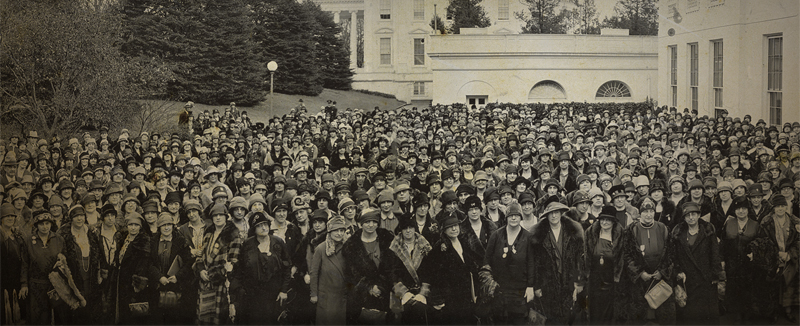
—Melissa R. Klapper
The current media fascination with women and power, sparked by elaborate controversies over Yahoo executive Marissa Mayer and Facebook executive Sheryl Sandberg, might seem both disappointing and amusing to the legions of American women engaged in social and political activism during the first decades of the twentieth century. The disappointment is easy to understand. Why, they might ask, after more than 100 years of feminism, are we still disconcerted by women in positions of authority? And why do we still have to confront systemic conflicts between work and family? And why don’t women support each other more, and better?
The amusement may require more explanation. Much of the commentary in recent weeks has assumed that there was once upon a time a golden age when women didn’t work, when men provided for the families women took care of. Only after the feminism of the 1960s and 1970s did everything fall apart as women entered the workforce. Any undergraduate in a women’s history class can tell you how very wrong this understanding is. Women have always worked, out of both necessity and desire; not all women have had a male provider in their lives; one individual’s wages have rarely been sufficient to support a family.
Apart from this critical perspective, I think there is another element of the historical record that demands attention. There is no denying that some women, typically of middle and upper class status, did not work for wages. That does not mean, however, that they did not work. During the early twentieth century, the mostly unpaid but extremely professional women who belonged to voluntary organizations affected every level of public life in the United States.
In my new book Ballots, Babies, and Banners of Peace: American Jewish Women’s Activism, 1890-1940, I explore the many roles Jewish women played in the suffrage, birth control, and peace movements. Whether as individuals committed to a cause, members of inevitably politically active Jewish women’s organizations like the National Council of Jewish Women, or members of international women’s activist groups like the Women’s International League for Peace and Freedom, Jewish women accomplished with pen and paper and the occasional telegram or phone call what huge NGOs strive to do today.
The millions of American women who participated in social movements traveled constantly, lobbied public officials, attended innumerable meetings, read voraciously and participated in study groups, drew up position papers and set policies, monitored the press and wrote frequent letters to editors, and sustained voluminous correspondences, usually without secretarial help. Freedom from paid labor enabled these women to do this kind of work, and they often began by trying to improve the circumstances of other women who had fewer choices.
Civil society depended on women’s volunteer efforts, and the success of these women in making change in government at every level from municipal to federal played a critical role in the development of the responsive government and social welfare provisions we take for granted today. So I think that the activist women of the early twentieth century would also be amused by today’s controversies. Why, they might ask, would anybody think that women have not always grasped the opportunity to shape the world they live in?
Melissa R. Klapper is a professor of history, Rowan University in Glassboro, NJ. She is the author of Ballots, Babies, and Banners of Peace: American Jewish Women’s Activism, 1890-1940 (NYU Press, 2013).
